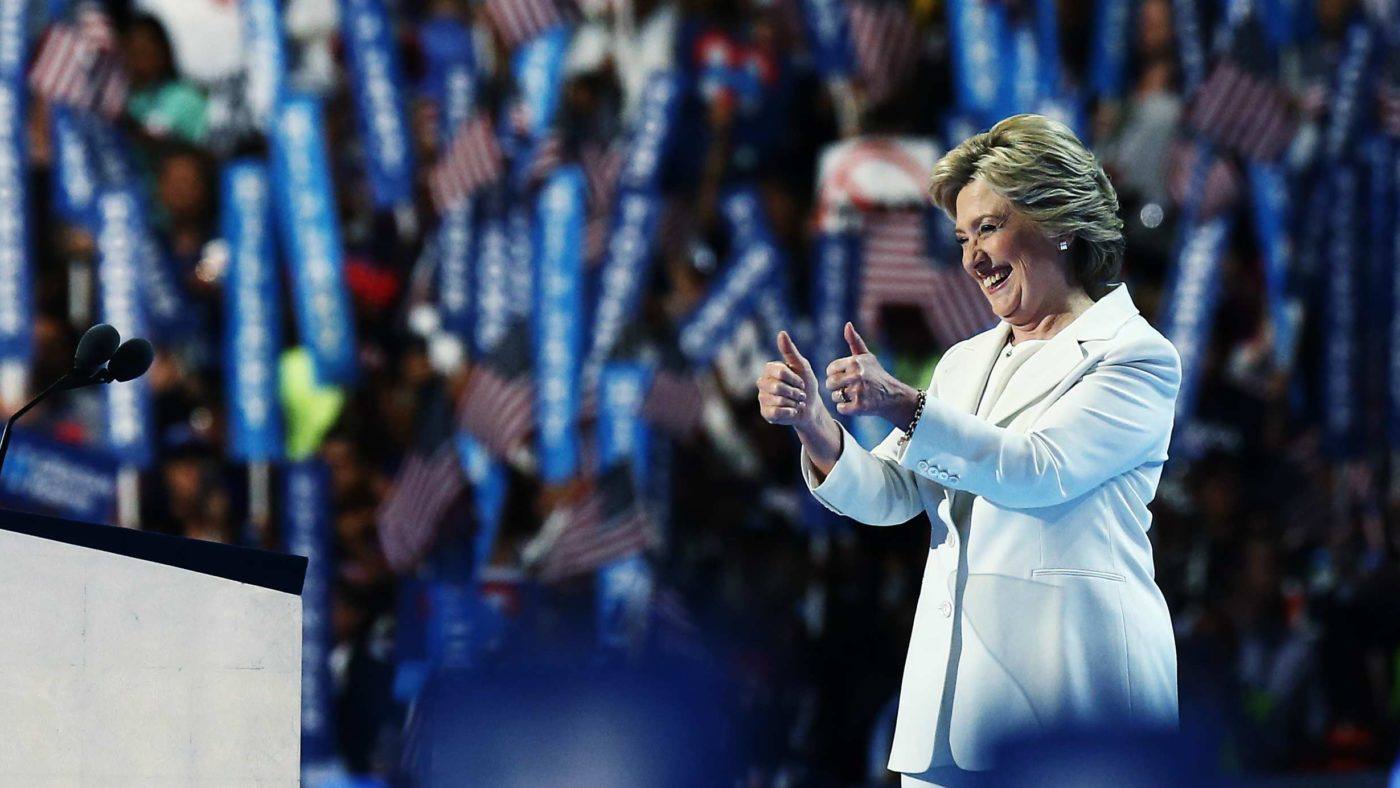This is the weekly newsletter from CapX. To receive it by email every Friday, along with a short daily email of our top five stories, please subscribe here.
US Democratic Party Presidential nominee Hillary Clinton last night made her acceptance speech to the Democratic National Convention in Philadelphia. Much like the candidate herself, it was a dependable speech, an experienced speech, an intelligent speech. But also like the candidate it was a speech lacking in charisma and an aura of inspiration.
This is not necessarily bad for Mrs. Clinton. The speech tried to be everything her opposite number Donald Trump’s previous effort wasn’t: optimistic, forward-looking, calm, rational. That Clinton cut a dependable figure who didn’t need to fall back on the crutch of a brash personality will only further juxtapose her with Trump.
This isn’t the message of hope that propelled Barack Obama into office, and it’s notable that while Hillary’s speech will fade from memory within weeks, Michelle Obama’s astonishing oration is bound to be recalled at every DNC for decades. But she doesn’t need to be loved. Republican pollster Frank Luntz recently told BBC Hardtalk that 40% of Americans will guarantee their vote to either party, leaving 20% of the country up for grabs. Because only eight or nine states are actually liable to be swing states, both candidates are really only fighting over the votes of about 4% of the population. The X-factor will be the debates – will Trump’s brazenness continue to steamroll all before him? Or will the calm and steady hand of the experienced female be the beginning of the end for the extremist candidate, much like new UK PM Theresa May and her Marxist opponent Jeremy Corbyn?
It will be interesting to see in the next few days whether Clinton gets the usual “convention bounce” that would edge her back in front in the polls (remember after the Republican convention in 2008, McCain briefly led Obama). FiveThirtyEight’s Nate Silver (who famously called all 50 states and D.C. correctly in 2012) has been warning that the race is much closer than people think. His ‘Now-cast’ – a snapshot of what might happen were the election to be held today – rates Trump’s chances as a 53%-47% probability. This is significant but still no reason for Hillary fans to panic; his ‘Polls-plus’ model – the one that got it so right and he believes we should be paying most attention to – has the former New York Senator’s chances at 62%-38%.
For American readers of CapX who are market (classical) liberals and believe in popular capitalism, this election may present quite the dilemma. Traditionally Republican-leaning, they will be horrified by the authoritarian shadow cast by Trump. They will also be deeply sceptical of Clinton, a (modern) liberal statist who is running for the third term of Barack “you didn’t build this” Obama and has been forced even further to the left by her primary opponent Bernie Sanders.
Some wish to see a higher profile for Libertarian candidate and former Republican governor of New Mexico Gary Johnson. Backed up by running mate and former Republican governor of Massachusetts Bill Weld, Johnson is perhaps the most appealing candidate in such a three-way race, though he will likely remain under the radar of most mainstream voters given America’s two party-focused campaign schedule.
For Johnson the magic number is 15. That’s the nationwide percentage he has to be polling with five selected organisations before the Commission on Presidential Debates allows him to appear alongside Trump and Clinton. If he could achieve this unlikely goal all bets would be off. Given the anti-politics mood and unlikeable candidates of both major parties, there would be a real chance of a third party making the biggest impact since 1992 when Texan billionaire Ross Perot secured nearly 19% of the national vote.
Johnson’s most realistic hope of success probably comes in Utah, where his numbers are high enough that one shock poll showed the solidly red state as a tie between Trump and Clinton. With rumours of Beehive state resident Mitt Romney endorsing, or at least voting for, Johnson, it could realistically be in play. Such a performance could push the liberty caucus within the GOP into a more powerful position, strengthening the prospects of a Rand Paul or Ted Cruz next time out.
Of the arguments conservatives have advanced to hold your nose and vote for Trump, the prospect of having President Clinton in charge of Supreme Court Justice appointments is the most effective. But it does not diminish the fact that GOP officials are asking Americans to elect an egoist, racist, authoritarian into office. This would not only mean the capture of the highest office in the land by such an unstable candidate, but eight years of either demagogue or Democrat in executive office. Who do Democrats turn to after Hillary loses? Probably Trump’s left-wing counterpart Elizabeth Warren.
The sad truth is, it is far better for the Republicans to lose the executive office now (and possibly, just maybe, hold on to the Hill), regroup, and come back with a decent candidate in 2020. Although Trump may have changed the rules of primaries for good, he would be a discredited failure as a nominee and Republican voters just might be prepared to pick someone fit for office who would stand a better-than-good chance of beating an unpopular President Clinton.
Even a bad Hillary Clinton may end up saving America from a far worse future.


